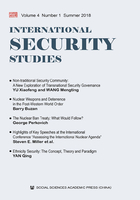
Nuclear Weapons and Deterrence in the Post-Western World Order
Abstract: Global international society (GIS) is in a significant period of change. The longstanding Western order is under siege from several different directions including the diffusion of power, a mounting crisis within global capitalism, and a variety of shared threats from terrorism, through mass migration, to environmental change. Brexit and the election of Trump suggest that even the Anglosphere core of world order has lost its grip. I argue that the pattern of current developments points to the emergence of a post-Western world order that will be deeply pluralist. There will be no superpowers in this order, only great powers. Most of these great powers will be autistic, and there will be no real competition for global hegemony. Cultural differences will be more important than ideological ones. The paper sketches out the general contours of this order, and then explores the general implications of this for the role of nuclear weapons and deterrence in the coming decades. The main focus is on a shift from the global to regional level, and on the complex dynamics of nuclear proliferation and deterrence.
Keywords: deterrence, extended deterrence, global international society, proliferation, shared fates